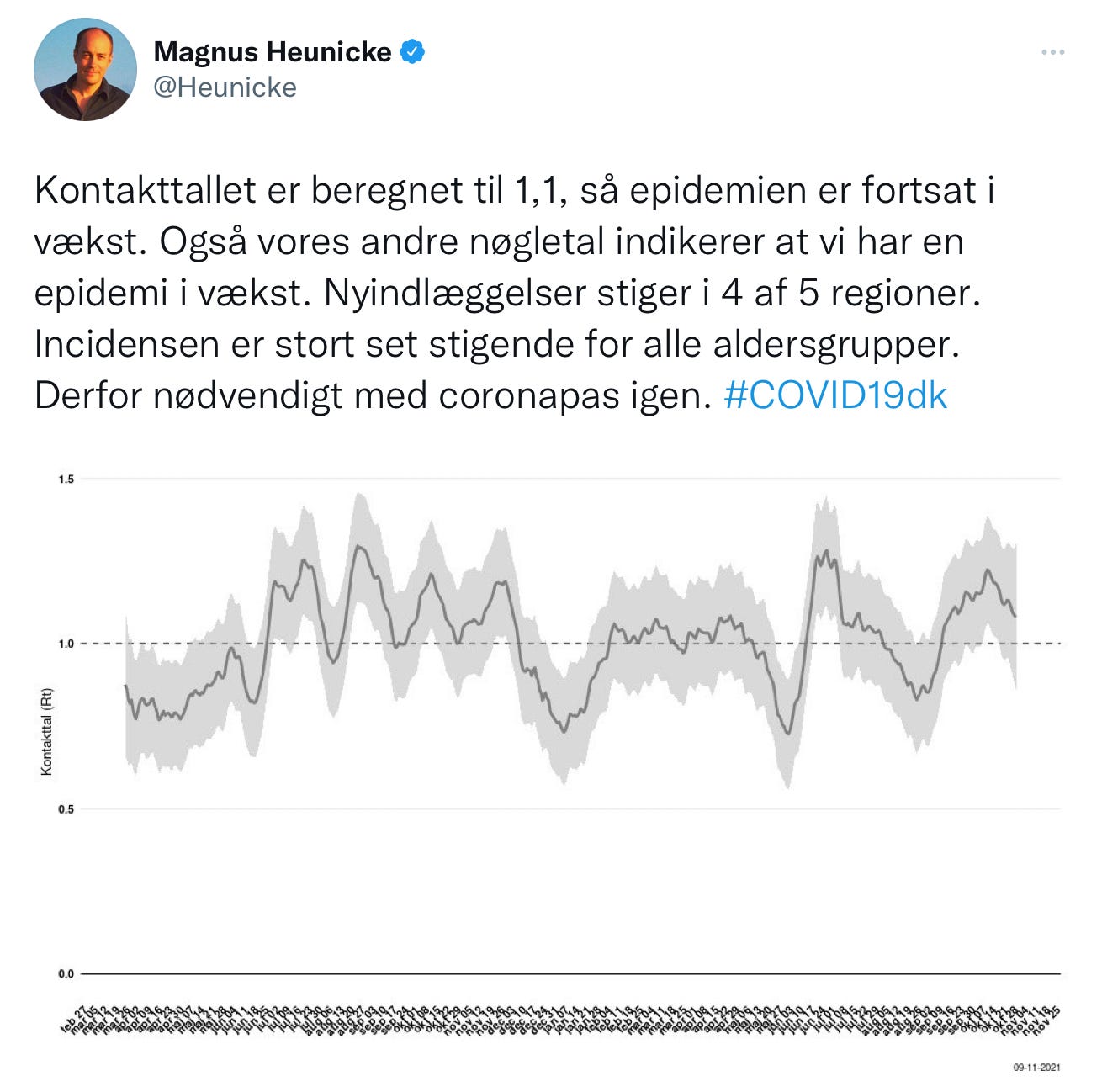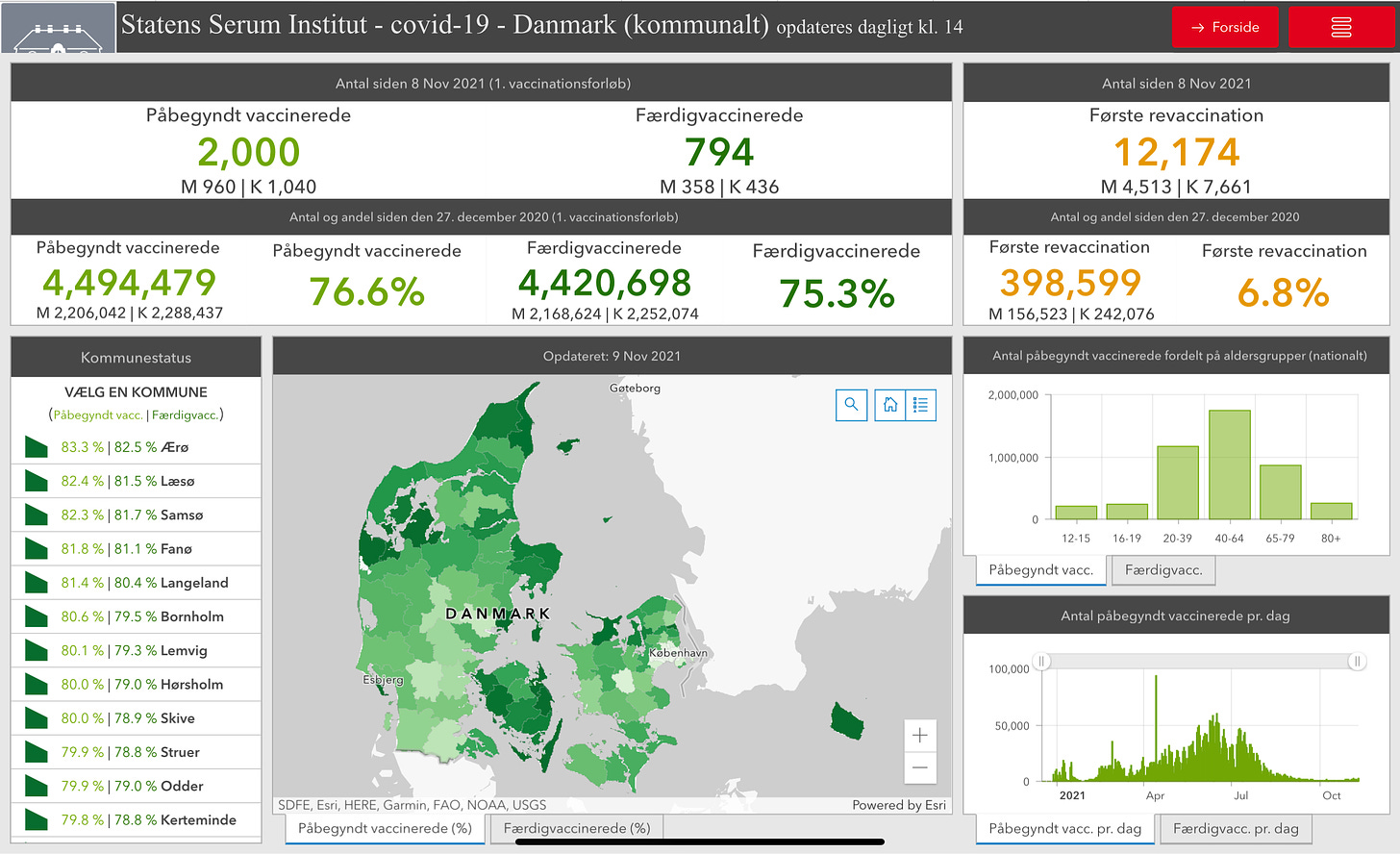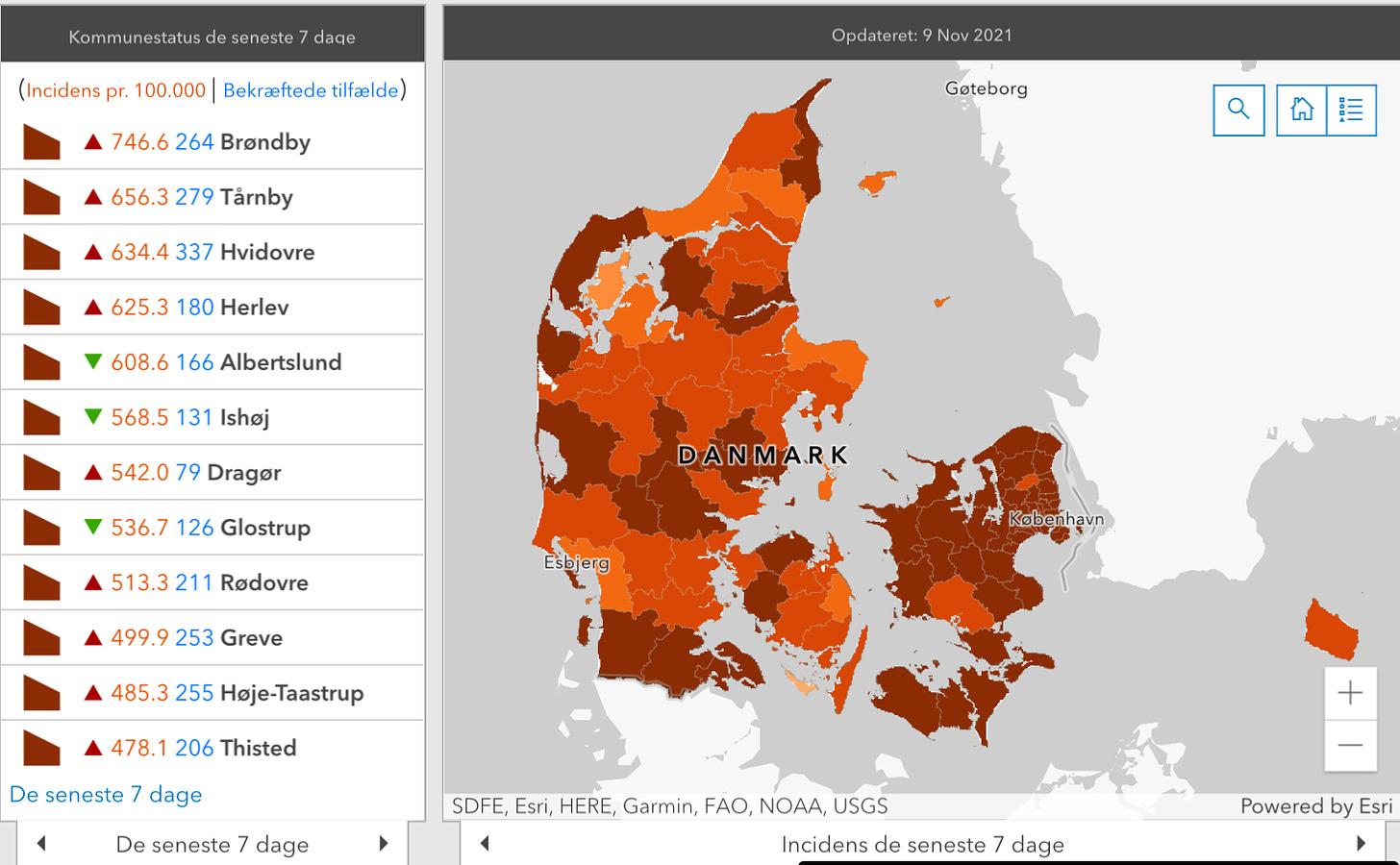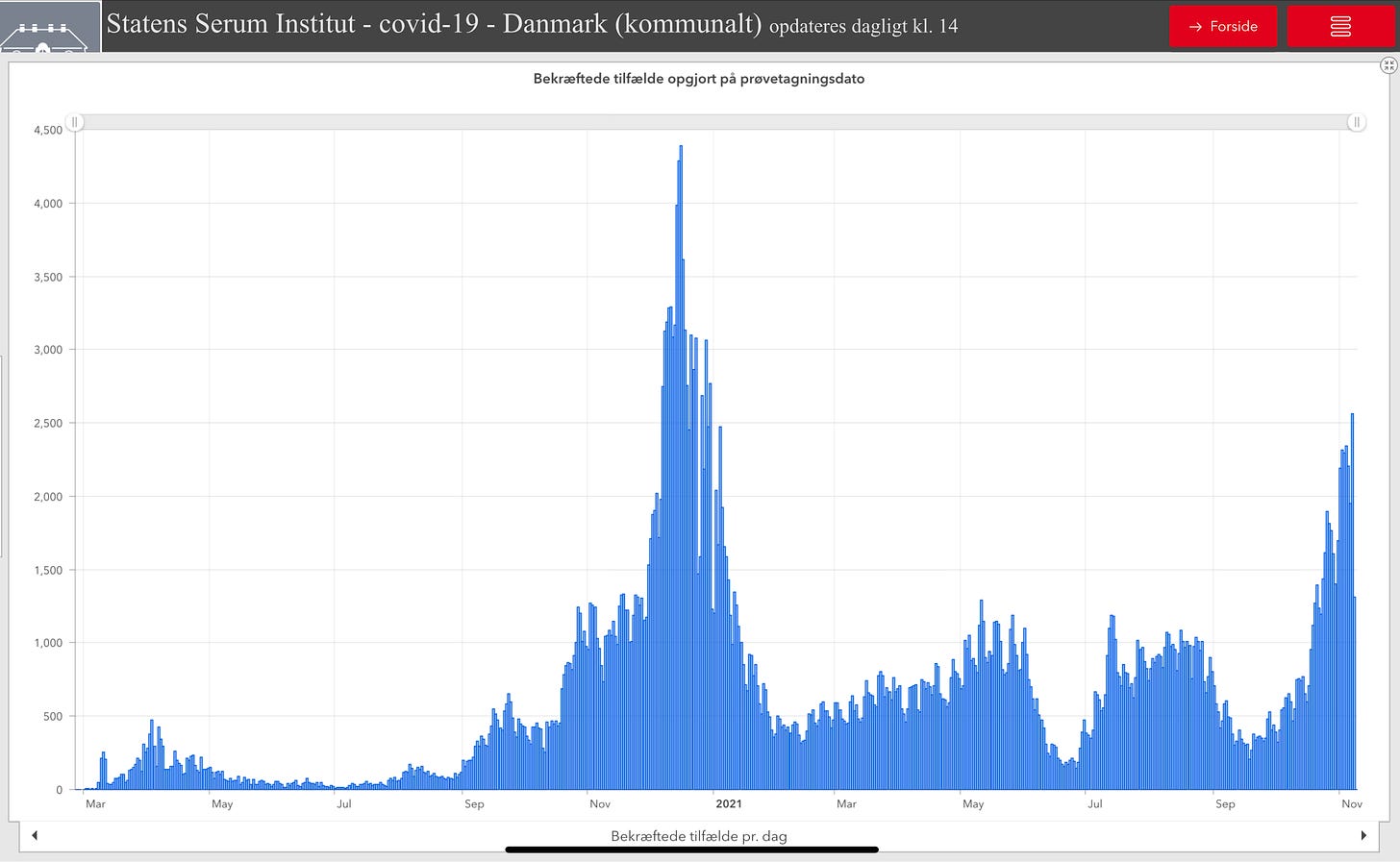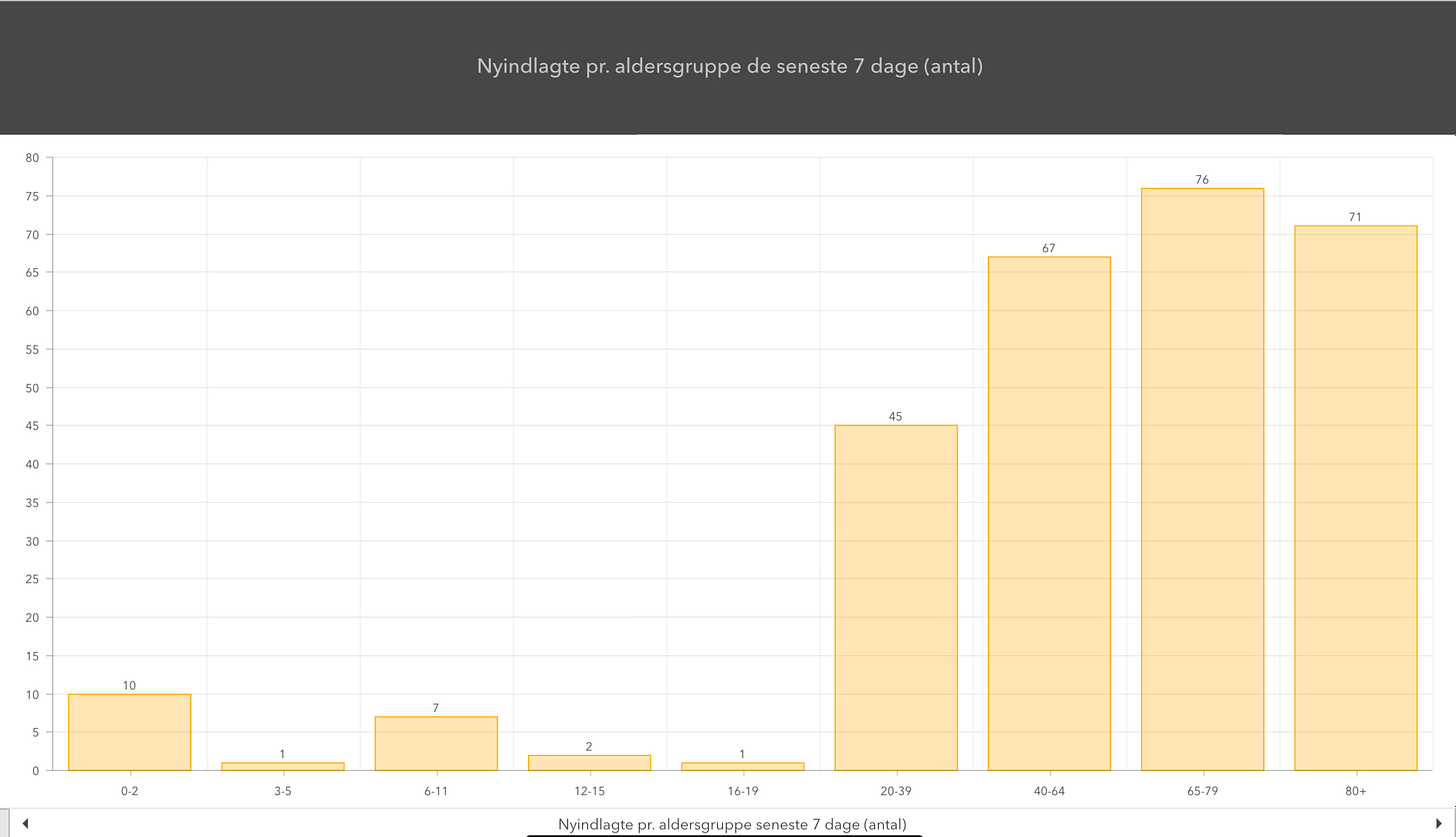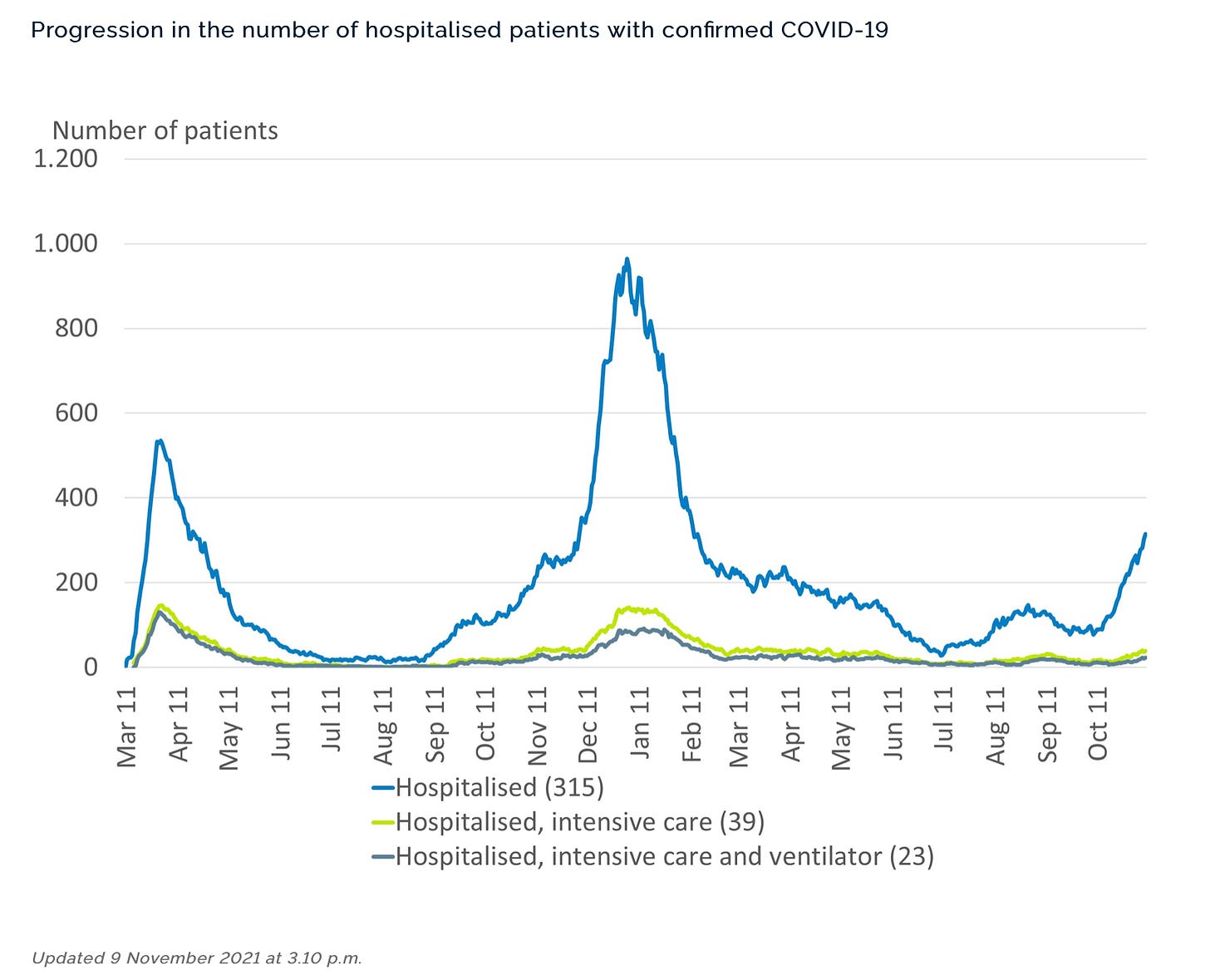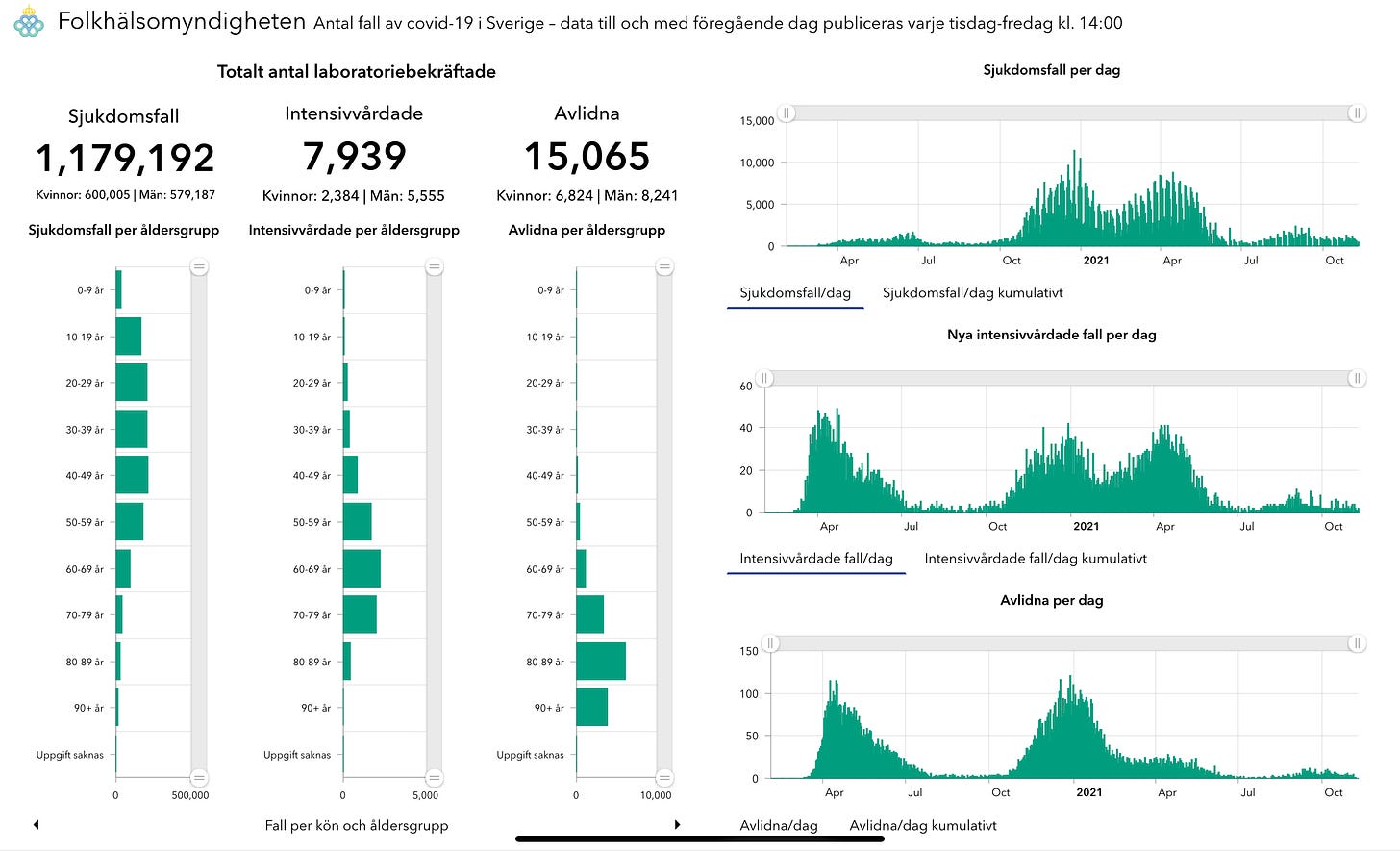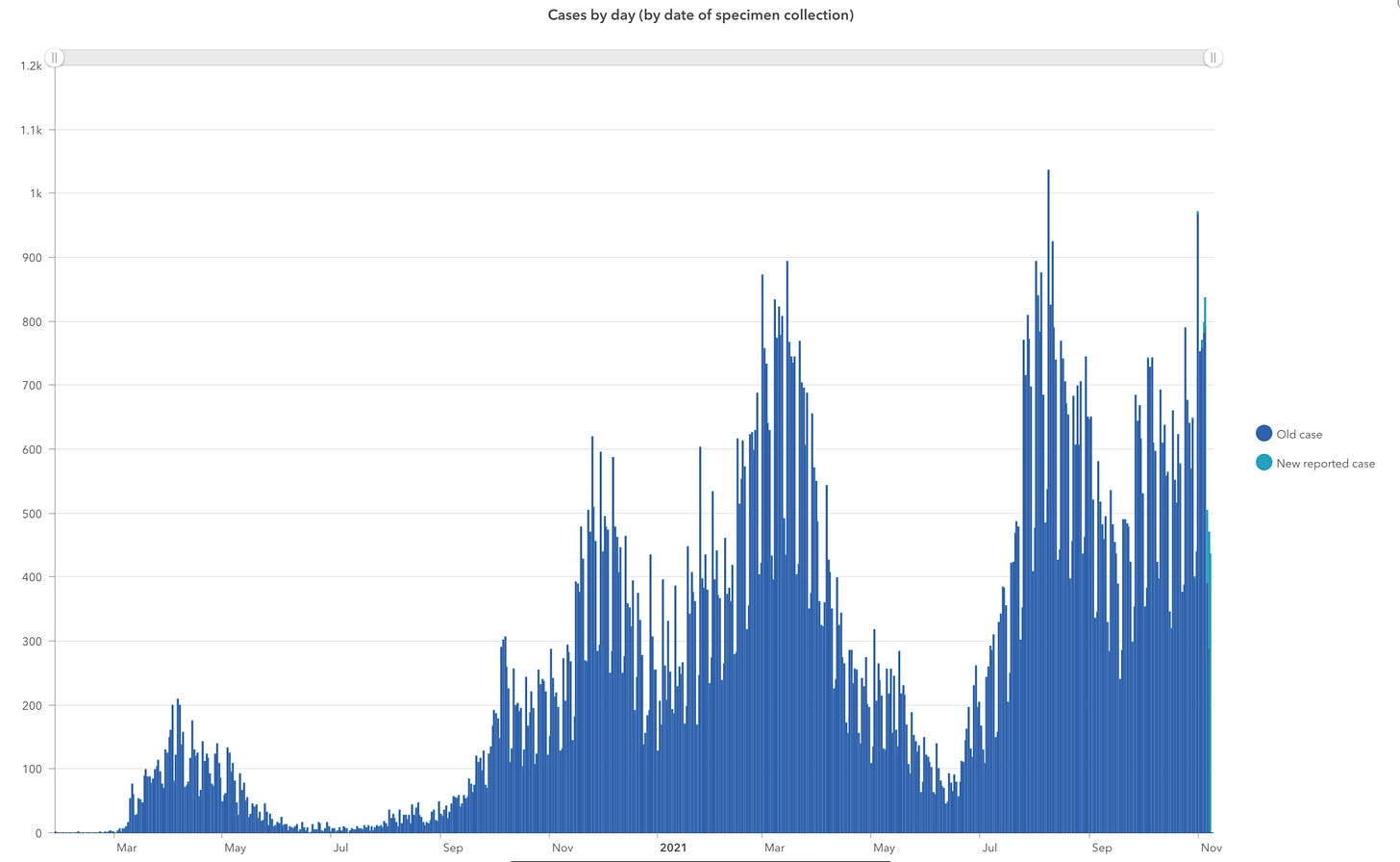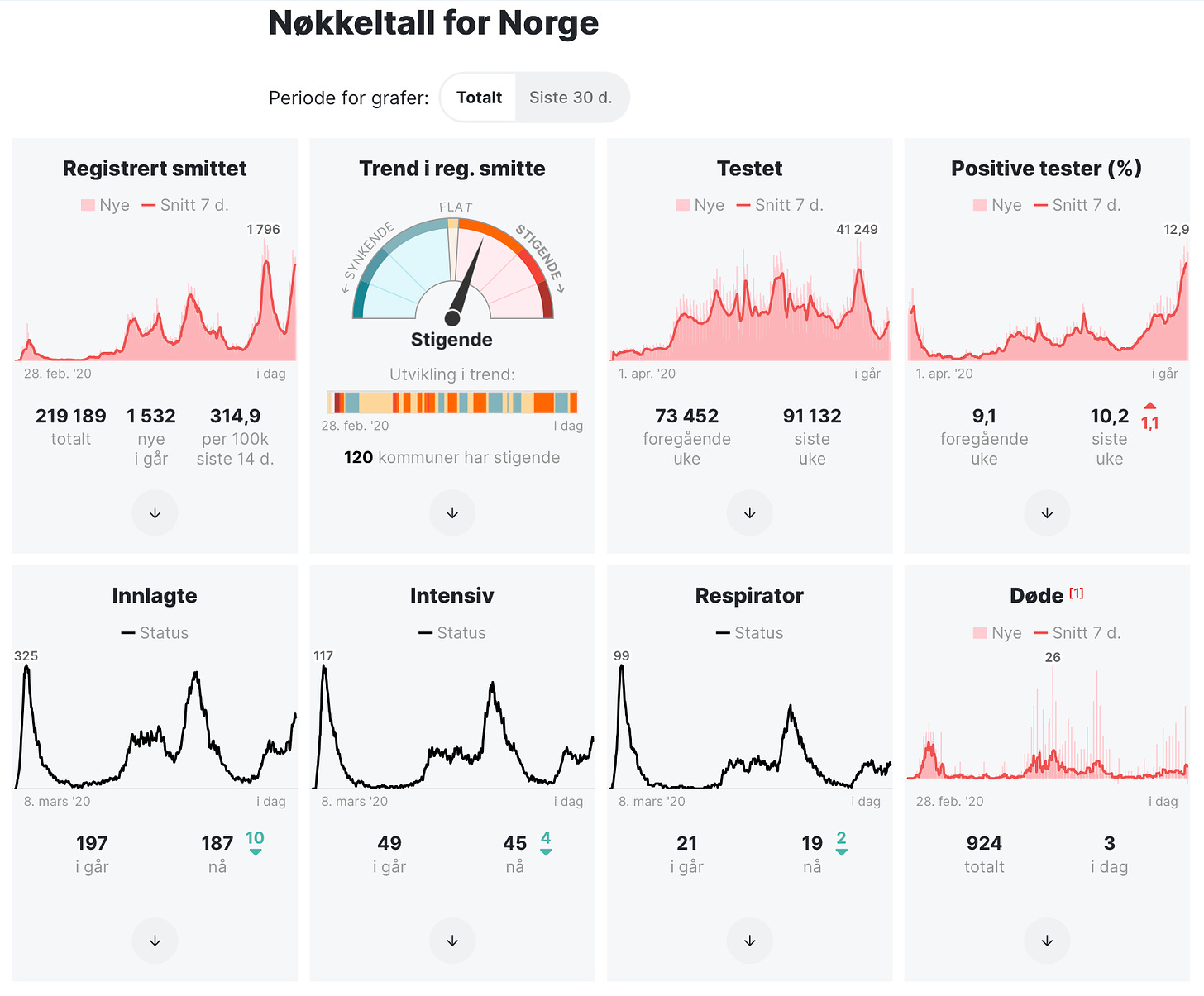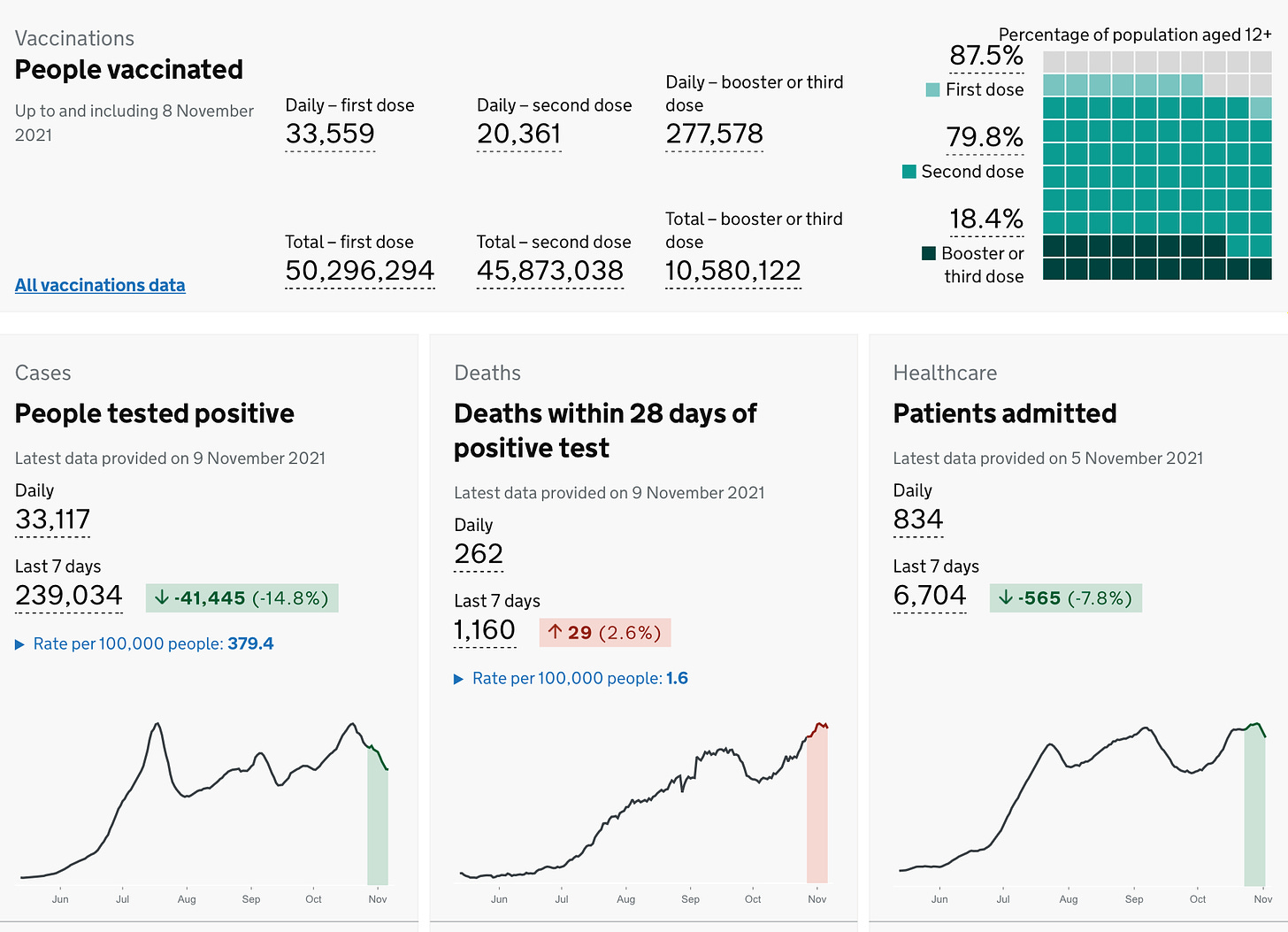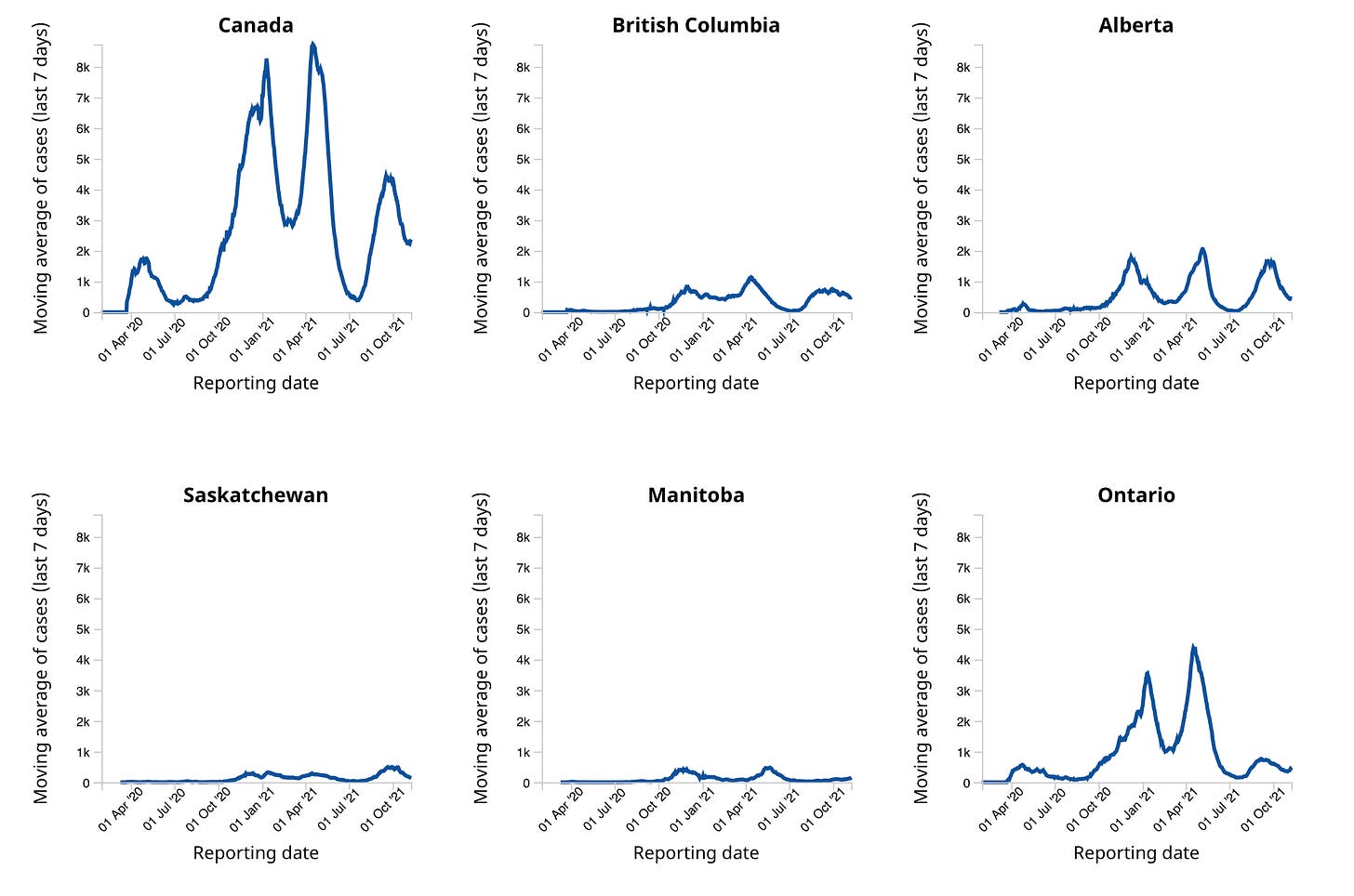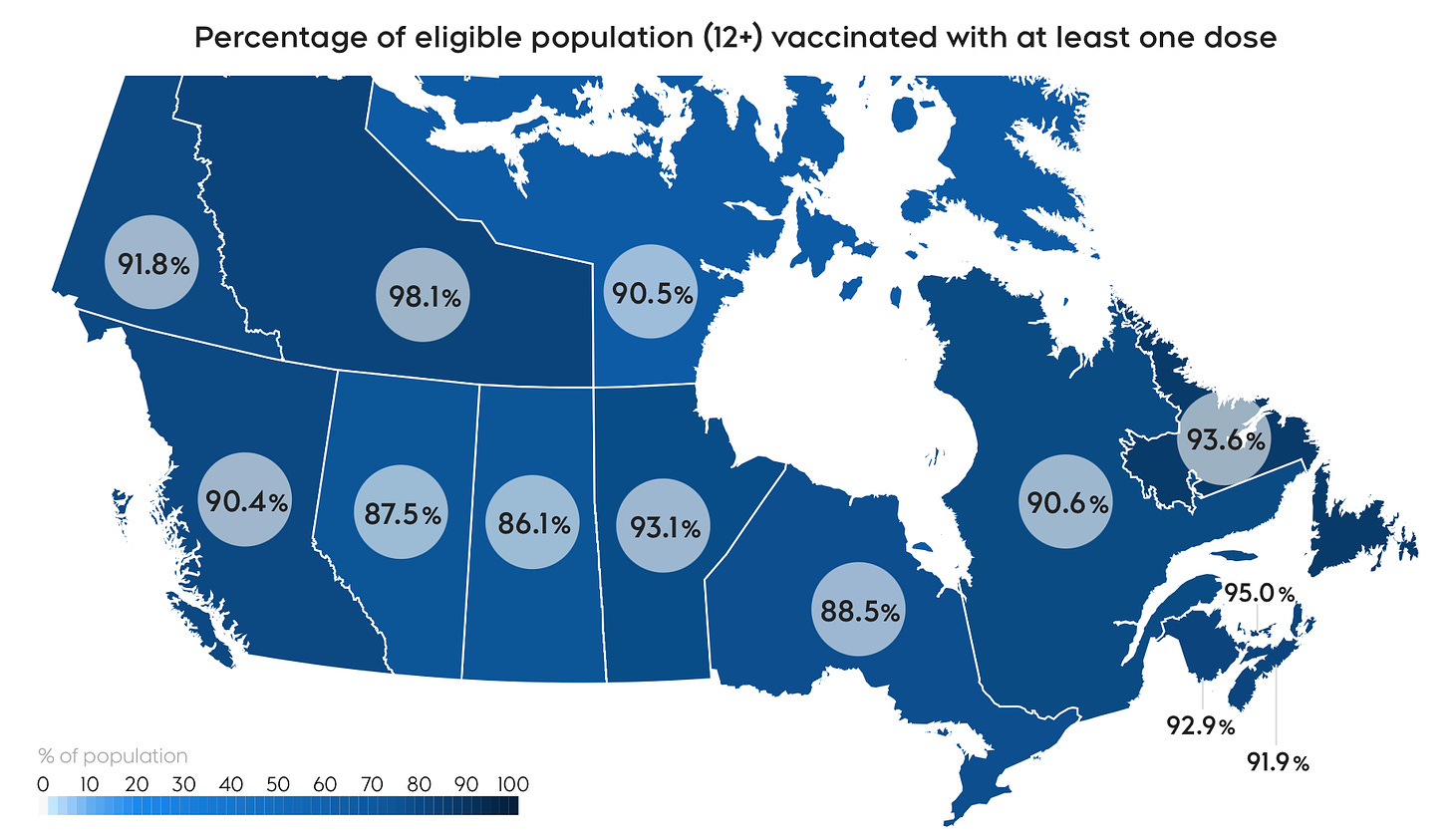🇩🇰
The Danish Parliament’s Epidemic Committee has again designated coronavirus as a ‘socially critical disease.’ The designation empowers the government to levy a number of measures and restrictions to bring down the infection curve. In restoring the designation, the commission cited a rapid growth in COVID hospitalizations and an expectation that those numbers would continue to increase “towards Christmas.”
As a result, the coronapas vaccine passport system will be reimposed across Denmark as of Thursday. The government had initially asked for the designation to remain in place for four months, but members of the committee went a different direction. Instead, the designation will be reassessed every four weeks.
Committee Chair Stinus Lindgren spoke to DR:
“We have given support to reclassify coronavirus as a socially critical disease, but with the difference from the government's recommendation that we must revisit the decision every month. It has consequences for the whole of society, and therefore I think it is wise that we are in constant contact with the government.”
Health Minister Magnus Heunicke:
“We know that increases in infection are followed by increases in hospital admissions. So even though we have good control of the epidemic and a high level of vaccination support, we need to act now. I am therefore also very pleased that a broad majority in the Epidemic Committee has just backed the recommendation of our Epidemic Commission and the independent experts to categorize COVID19 as a socially critical disease and to reintroduce the coronapas again.”
When the coronapas returns there will be some changes. The age of use has been lowered so that it applies to everyone 15 years old and older. For those who have had a COVID infection, the length of immunity in the app will be reduced from 12 to six months.
While a finite list of places where the coronapas will be required is still being hammered out, the commission has decided that it will apply to hospital visitors. However, close relatives, guardians, and lawyers are exempt.
We know from yesterday”s press conference that the coronapas will apply in a variety of indoor spaces, events, and nightlife venues. These would include nightclubs, cafes, restaurants, party buses, and large events.
Church and Culture Minister Ane Halsboe-Jørgensen told DR today that the coronapas will apply to any venue that has an indoor capacity of more than 200 people, including bars and restaurants, and any outdoor event with over 2,000 attendees. She says it will for the first time also apply to funerals, christenings, and church services.
“I want to do everything I possibly can to keep cultural life open. And we can do that for now by introducing coronapas. We are facing a potentially harsh winter, where we need to battle corona infection.”
-
Yesterday, Danish Industry, a private trade group representing about 18,000 companies in Denmark, called for the coronapas to include a legal basis so companies could require employees to show their vaccine passport. Today, Acting Employment Minister Mattias Tesfaye told newspaper Jyllands-Posten that this is something that is on the table.
“It must be safe to go to work, and we must keep the infection down. Therefore, we would also like to discuss proposals that can help reduce the infection.”
-
Denmark’s Health Minister Magnus Heunicke says the COVID contact number (reinfection rate or R0) remains at 1.1 for a second week in a row. Heunicke cautions that the epidemic is still growing as hospitalizations are increasing in four out of the five Danish health regions. He says the coronavirus incidence rate is also rising across all age groups.
The health minister also had some promising news. Heunicke says 37,015 people booked a vaccination appointment yesterday, more than three times the number from the day before.
Yesterday Heunicke along with Prime Minister Mette Frederiksen, Danish Health Board Director Søren Brostrøm, and Staten Serum Institut Director Henrik Ullum all urged those who have yet to be vaccinated to go get their shots. They backed up their plea with a plethora of statistics showing unvaccinated people are at much higher risk of infection, hospitalization, and death.
-
Region Sjælland also says it has seen a “significant increase” in the number of people booking vaccination appointments. In the 12 hours after yesterday’s COVID press conference from Denmark’s Statsminister and top health officials the health authority saw 2,153 people book a vaccination time for a 1st or 2nd vaccine dose. The region says this is a “very positive development.”
-
Region Nordjylland says it too, saw a hefty jump in vaccination bookings yesterday. The region says 5,349 people made a vaccination appointment yesterday, up from Sunday’s 1,658.
-
The Danish National Health Board says vaccination bookings are on the rise and efforts are underway to continue to encourage holdouts to get vaccinated. The agency reports that it is seeing increased numbers of first time vaccinations among 12 to 15 years olds and those aged 20 to 29 years old. In both cases those are age groups that are lagging all others in getting inoculated.
Assistant Director Helene Probst says vaccination numbers need to increase in order to reduce infections and keep hospitalizations down.
“It is very positive that more people are being vaccinated now. It benefits both themselves and others. If you are in doubt about whether to get vaccinated, it is important to talk to someone about it.”
To that end, she says, they are launching two new initiatives. The first is a ‘Vaccine Counseling’ hotline where vaccine-hesitant people can call and ask questions and air any concerns. People can text “vac” to 1231 and a vaccine advisor will reach out within a day or two.
“If you have any concerns about being vaccinated, it's a good idea to talk to your doctor about it. But we want to make sure that there are more ways to get help for this choice, and therefore we have now also established vaccine counseling.”
The second is a group called the ‘health information corps’ to go into municipalities with low vaccination rates to hold events and get people informed. On the hit list for this group off the bat will be association and housing organizations in Odense, Kolding, Aarhus, and kommunes in Western Copenhagen.
-
On the vaccination front the number of 1st doses administered yesterday rose back up to 2,000, which is positive. Yesterday, there were 14,968 total inoculations with the lion’s share being booster shots.
To date, 76.6% of the total population has one dose, 75.3% have two, and 6.8% have had a 3rd booster dose.
-
All but 10 of Denmark’s 98 kommunes have a COVID incidence rate per 100,000 residents of 100 or more. Of those, 45 municipalities have an incidence rate of 300 or higher.
-
Denmark is reporting 2,562 COVID infections and two more coronavirus deaths in the last day.
Yesterday, there were 216,364 total corona tests, the highest daily total in many weeks, of which 109,694 were PCR tests equaling a positivity percentage of a very high 2.34%.
-
A truly alarming number of children are becoming infected with coronavirus. In the last seven days alone, 3,737 kids between the ages of 6 to 11 years old have tested positive. There have been 573 infections among 3 to 5 year olds and 889 in the 12 to 15 age group. Thankfully, those concerning infection surges among children have so far not been reflected in hospitalizations.
-
COVID hospitalizations (315) continue to climb (+12) while the number of infected people in an ICU (39) is also up (+3) and of those the number on a ventilator (23) also edged upward (+2).
-
Copenhagen Kommune has now closed two primary schools as Strandparkskolen in Valby joins Dyvekeskolen on Amager where students have been sent home due to COVID outbreaks. In both cases classes in grades 0-6 will remain closed for at least a week.
🇸🇪
Sweden has added 2,098 infections and eight more virus deaths since its last update on Friday.
So far, 7,269,640 1st vaccine doses (85.1% of pop 16 years old and older) and 6,947,143 2nd doses (81.3%) have been administered.
The Swedish Public Health Agency has not updated vaccination statistics for 12 to 15 year olds and for booster shots administered.
-
While Denmark, Norway, and Finland all battle serious infection activity, Sweden has so far managed to keep a lid on any new COVID surge. But the country’s top epidemiologist is warning that the country’s luck probably won’t last for long.
Anders Tegnell says you need just to look at all of Sweden’s neighboring countries and elsewhere in Europe to know that COVID remains a clear and present danger.
“We have a development in many of the EU countries right now which is a warning bell that we must keep an eye on. Several of them have vaccination levels similar to ours. This increases the probability that infections will also increase in Sweden. Healthcare must be prepared for the fact that there may unfortunately be more COVID patients again. It may also mean that we have to go back to some measures that we had in place before.”
-
In Southern Sweden they too are looking across the Oresund with growing concern.
Skåne's regional councilors Gilbert Tribo and Anna Mannfalk, are lobbying the Swedish government to implement a vaccine passport system.
“The situation is still serious and the pandemic must be taken seriously. We have for a long time experienced severe restrictions and people's freedom has been restricted to a broad extent. Now that the spread of infection is increasing again, the government needs to act and therefore we want the government to introduce corona passports that apply to everyone in society.”
-
In Sweden’s capital region infections eased slightly, but hospitalizations increased from week to week. Region Stockholm says there were 1,358 new infections last week, a slight drop from 1,583 the week before. The region is cautioning that there have been some testing changes. Last week there were 86 COVID hospital admissions, an increase of 12 from the week prior.
Infection Control Dr. Maria Rotzén Östlund:
“Hospital admissions have increased compared to last week. We hope that this is not a trend that continues, not least considering what the development looks like in the countries surrounding us. The vaccination rate among the elderly is high but young adults need to be vaccinated, both to prevent the spread of the infection and to protect themselves from infection and serious illness.”
She says since the beginning of July there have been more than 100 hospitalizations in the 18 to 29 age group.
Rotzén-Östlund is also urging people to get their flu shot this year as the region begins its part in a massive national influenza vaccination effort.
“There is a risk that the flu will be particularly intense this year. Therefore, it is especially important that those who are at risk of becoming seriously ill: pregnant women, people who are 65 years or older, and people with certain chronic diseases such as chronic heart or lung disease, get vaccinated as soon as they can.”
🇫🇮
Finland has registered 810 infections and another nine deaths since yesterday’s update as it continues to struggle with another infections surge.
COVID hospitalizations (256) are unchanged.
So far, 75.6% of the total population has one dose, 70.3% has two, and 1.9% have had a booster shot.
-
As pressure builds on the Finnish government over rising infection numbers, YLE is reporting that Prime Minister Sanna Marin, her cabinet, and coalition government members will meet today to discuss the worsening situation. The meeting is set for Wednesday afternoon at 4pm. Infections and hospitalizations are on the rise in Finland and as elsewhere cases are dominate among unvaccinated people.
In September, the Marin government approved a coronavirus strategy that tied dismantling all COVID-related restrictions once 80% of the population was fully vaccinated.
🇳🇴
Norway continues to struggle with its own major COVID surge with another 1,740 infections reported today along with three more corona deaths.
COVID hospitalizations (187) are down (-10) and ICU numbers (45) also declined (-4) and of those the number on a ventilator (19) inched downward (-2).
To date, 78.13% of Norwegians 12 years old and older have had one vaccine dose and 69.69% have had both doses.
🇪🇺🦠
As the COVID situation in Europe continues to deteriorate, it looks like the European Medicines Agency is trying to expedite a coronavirus treatment option. The agency says it is now “reviewing available data on the use of molnupiravir to support national authorities who may decide on the use of this medicine for COVID-19 treatment prior to its authorisation.” The EMA says it will table EU-wide recommendations “in the shortest possible time frame” to help health authorities across the EU decide whether to use the medication in an emergency use setting.
Molnupiravir is made by Merck and is taken in pill form, making it the first COVID medication to be taken orally. Clinical trials have found the pill helped reduce serious illnesses, hospitalizations, and death. It is currently under a rolling review by Europe’s pharmaceutical watchdog.
💉
Clinical trial results and data have now been published for the Pfizer/BioNTech vaccine trials for children 5 to 11 years old. There were 2,268 participants with the data showing very high efficacy levels of over 90% for the vaccine, a strong immune response, and no serious side effects.
From the study’s conclusions:
“A COVID vaccination regimen consisting of two 10-μg doses of BNT162b2 administered 21 days apart, was found to be safe, immunogenic, and efficacious in children 5 to 11 years of age.”
You can find the full study HERE.
🦠🇬🇧
A new study from the United Kingdom published in the medical journal The Lancet has found the Delta variant spreads much faster in a household. The study was done when both the Alpha variant and Delta variant were circulating in England. It found a 70% increase in the odds of household transmission resulting in infection from the Delta variant compared to the Alpha.
Study authors say the Delta variant “has a substantially increased transmissibility advantage over the Alpha.” And that advantage was one of the main contributors to the Delta variant roaring across the UK fueling a new infection wave and eventually replacing the Alpha variant entirely.
You can read the study HERE.
🇬🇧
Healthcare workers in the United Kingdom must be vaccinated to ensure “continued employment.” The vaccine mandate came down from British Health Minister Sajid Javid. He says the mandate is to protect patients, fellow healthcare workers, and the healthcare system in general. Healthcare workers in the UK have until April 1 to be fully vaccinated if they want to keep their jobs.
COVID numbers in the UK appear to be ebbing slightly again. Today it reported 33,117 new infections and 262 more deaths. Over the last seven days, infections and hospitalizations have both declined, but coronavirus fatalities have increased.
🇨🇦
Health Canada officially approved the use of a third booster dose of the Pfizer/BioNTech vaccine today. Vulnerable populations over the age of 18 and healthcare workers have already been receiving a third Pfizer dose before today’s decision was announced. The national healthcare agency says a third dose is to be given at least six months after a second inoculation. Health Canada’s review determined a third Pfizer dose met all safety, efficacy, and quality requirements with no new side effects.
-
Canada reported 2,138 infections yesterday and lost another 37 lives to coronavirus as total pandemic fatalities approached 30,000.
Nationally, the infection curve decline appears to be leveling off, and in fact in Ontario and Quebec numbers seem to be increasing again.
On the vaccination front to date, 29,871,408 1st vaccine doses (78.12% of the total population) have been administered and 28,497,729 people (74.53%) have been fully vaccinated. So far, 531,895 booster shots have been done.
A COVID state of emergency has been declared by the Yukon Government after it recorded 80 new coronavirus infections over the weekend. It is reintroducing restrictions including mandatory mask use indoors, capacity limits on gatherings, and a vaccine passport system covering everything from restaurants to faith-based gatherings.
In Ontario today there were 441 new infections, of which 268 were people who were either not vaccinated or who had a single dose. There are 244 people in hospital, with 175 of them being unvaccinated or having just one dose. Of the 134 people in an ICU, that number is 114.
Quebec reported 545 infections and six more deaths.
In Atlantic Canada, Nova Scotia recorded 55 infections and one death. New Brunswick has 52. Newfoundland and Labrador had nine.
Manitoba saw 185 infections and four more pandemic fatalities today.
There were in 86 new COVID cases in Saskatchewan today. That is the first time since August 23 daily cases have been under 100.
Alberta logged 422 infections and eight more deaths over the last 24 hours. Yesterday it reported 1,300 new corona cases and 13 deaths over the weekend. There are 608 people in hospital and 128 in intensive care, of which 86% are unvaccinated.
B.C. recorded Yesterday B.C. recorded 1,438 infections and 17 more deaths covering a three day period over the weekend. Today, the province revealed there are 3,071 unvaccinated healthcare workers now on leave.




